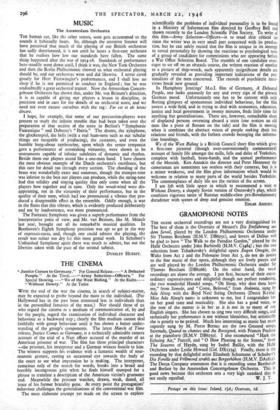THE CINEMA
' Justice Comes to Germany." For General Release.—" A Defeated People." At the Tivoli.—" Army Selection—Officers." For Special Showing.—" We of the West Riding." At the Rialto.— "Without Dowry." At the Taller.
WITH the end of the war the cinema, in search of subject-matter, may be expected to probe beyond the mass to the individual. (For Hollywood has in the past been interested less in individuals than in the personified fantasies of the mass.) Nor should those of us who regard the cinema as a medium of communication of, by and for the people, regard the examination of individual character and behaviour as a backward step ; clearly the film medium cannot deal faithfully with group behaviour until it has shown a better under- standing of the group's components. The latest March of Time release, Justice Comes to Germany, is a technically admirable camera account of the trial of a Nazi officer accused of the murder of an American prisoner of war. The film has three principal characters —the prisoner, his interpreter and a German witness hostile to him.
The witness supports his evidence with a fantastic wealth of near- neurotic gesture, casting an occasional eye towards the body of the court to see what impression he is making. The interpreter, conscious only of the search for words, breaks into a broad and horribly incongruous grin when he finds himself stumped for a
phrase to translate a description of the American victim's gruesome end. Meanwhile the prisoner watches, drawn, weak, dazed, all trace of his former brutality gone. At every point the protagonists'
behaviour challenges the .generalisations of the conventional war film. The most elaborate attempt yet made on the screen to explore scientifically the problems of individual personality is to be found in a Ministry of Information film directed by Geoffrey Bell and
shown recently to the London Scientific Film Society. To write of this film—Army Selection—Officers—is to tread thin critical ice since the writer was in very small part concerned with its produc-
tion, but he can safely record that the film is unique in its attempt to reveal personality by showing the reactions to psychological tests of a group of candidates for commissions who are appearing before a War Office Selection Board. The stumble of one candidate over- eager to set off on an obstacle course, the written reaction of another to a picture of ship-wreck, such apparently insignificant details are gradually revealed as providing important indications of the per- sonalities of the men concerned. The records of psychiatric inter- views break new ground.
In Humphrey Jennings' M.o.I. film of Germany, A Defeated People, one looks anxiously for any and every sign of the present German mood. Unfortunately one has to be content with only fleeting glimpses of spontaneous individual behaviour, for the film covers a wide field, and in trying to deal with economics, education, justice and local government in twenty minutes, finds little time for anything but generalisations. There are, however, remarkable shots of displaced persons swarming aboard a train (one notices an old man like a piece of flotsam on the tide) and the film is moving when it combines the abstract voices of people seeking their lost relations and friends, with the forlorn crowds besieging the informa- tion hoardings.
We of the West Riding is a British Council short film which gives a first-rate pictorial (though over-conventionally commentated) account of family life athongst the mills, fells and dales of Yorkshire, complete with football, brass-bands, and the annual performance of the Messiah. Ken Annakin the director and Peter Hennessy the cameraman are sometimes too restless with their cameras, but it is a minor weakness, and the film gives information which would be welcome in relation to many parts of the world besides Yorkshire. The commonplaces of daily life are the rarities of the screen. I am left with little space in which to recommend a visit to Without Dowry, a shapely Soviet version of Ostrovsky's play, which combines vigorous satire of Russian middle-class pre-Revolutionary decadence with scenes of deep and genuine emotion.
EDGAR ANSTEY.






























 Previous page
Previous page